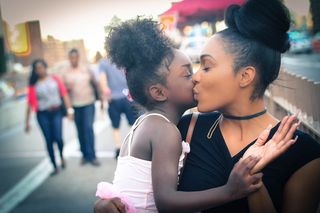Divorce
Quality Parenting Needed Most During Divorce
Don't be Fooled If Your Child Acts Like Your Divorce Has No Impact
Posted June 4, 2018

I was so emotionally devastated by the unraveling of the relationship with my husband that I know I did not always respond in the best way possible. I've always been very involved with my children and love them more than anything, but I don't feel that I was able to respond to them the way I would have if I had been more emotionally stable. I never neglected my children, but I don't think I was able to be as present for them as I wish I could have been. - Parent (Married 15 years)*
My parents got divorced at a time when I should have been focusing on good grades and planning to go to college to study further. With the divorce, college wasn’t even a consideration and my schoolwork suffered immensely. I went from being top of my class to just barely scraping by. I was robbed of a stable, happy home. And I feel like I was robbed of an opportunity to gain a good education because I was lacking the security, stability, and support that I needed at a crucial time in my development to help me become a well-balanced, emotionally strong woman who felt secure with who she was and her abilities and talents… - Forty year-old (child age 18 at the time of divorce)*

Parenting is one of the greatest experience in life. There’s nothing more miraculous than participating in the creation of a human being and sharing in your child’s development. Your identity as mom or dad is one of the most cherished position that life has to offer. However, when divorce strikes, life as you know it comes to a halt, often with devastating consequences. As a result, children feel alone and deprived of the attention that they require to adequately develop, much less to thrive. Divorce can also snatch away the blessing of parenting and bring an end to functioning effectively in this role –leading you to adapt and adjust your parenting techniques to something much less than a guardian or support.
One thing for certain is that responding to your children’s needs can enable you to gain perspective on your priorities. In so doing, you will gain the capacity to confront the deeper questions ahead:
- What is in the best interest of my children? How do I determine this?
- How are changes in my behaviors, result from the divorce, affecting the well-being of my children?
- Do I understand how the consequences of my divorce will affect my children’s lives (e.g., how to address custody? or transplanting them in their home base?)
- Will my children be prepared to manage these new changes in their lives? How will they manage changes in the family dynamics?
- How can I most effectively discuss the divorce with my kids and retain my bond with them?
- How will I safeguard or limit damaging effects of divorce for my children—and avoid alienating them from my former spouse?
- How do I meet my personal needs and remain a constant for my kids?

If you do not have a grip and actively attend to these questions and determine relevant answers, divorce can be a precursor for a bumpy ride ahead with dangerous consequences for both you and your children. Parents frequently pursue divorce without recognition of the impact that the divorce will have on their children, including children's greater risk for negative consequences such as reduced academic success, social maladjustments, significant physical and mental health effects, crime-related behaviors, and the greater likelihood of suicide. It doesn’t have to be this way!
You have the capacity to save your children from the damaging impact of divorce. You must take steps to retain your composure during the divorce process and respond to the needs of your children as you are your children’s best resource. To guide your children optimally, you need both to understand yourself and your role as a parent for sustaining your children’s healthy growth and development. By actively engaging and nurturing your children during the moments of their greatest crisis, you will be present when they need you most, deepening your bond as you guide your children safely in their unique pathway.
I did not express my feelings because nobody asked me what I thought or felt. – Forty-Four Year-Old (Child age nine at the time of divorce)*

The classic collusion between parents who divorce and their children, expressed in this quote from In the Divorce Study,* results from inadequate exchange, rendering children silent. Children often cannot communicate what they feel when they are caught in the middle of their parents--as they feel at odds with themselves. While it’s wrong to disclose adult details to children or to embroil them in a spousal battle, addressing the reality of the divorce does not mean spewing negative emotions about your former spouse. Such actions invariably occur during divorce and inflict indelible emotional wounds. Because of these distressful dynamics, children describe their feelings during their parents' divorce as "filled with...confusion,” “anger,” “loneliness,” “sadness,” and “agony,” as reported in the Divorce Study.*
They didn’t listen. They were both so self-involved. I ended up with an ulcer and medically hospitalized from all the turmoil and was out of school for over a year because of it. - Fifty-One Year-Old (Age five at the time of divorce)*
Neither one of my parents were interested in how it affected us kids. They were in it to use us as pawns in there horrible game of revenge. - Twenty-Eight Year-Old (Age twelve at the time of divorce)*
I did not express my feelings because nobody asked me what I thought or felt.”– Child Forty-Four Year-Old*
Children of divorce need even more reassurance, attention, and support to secure their foundation as they focus on discovering themselves.

Parents need to strive to preserve as much of their children’s childhood as possible. Making time for family fun, adding new routines and rituals, and celebrating events is essential. While divorce usually places much more of a premium on free time, parents should not cut back on quality time with their children, making a point to carve out attention with their children--and not leave them with others and technology baby-sitting. By being present and establishing new and meaningful routines through such activities as taking walks, shopping together, fishing, or cooking, children feel a bond and assured of their significance in their parent’s life. A divorce does not have to mean that the family ends and that children are uprooted.
Making room for quality time at the end of the day for one-on-one wrap ups of “what happened today” will keep parents aware of their kids’ world and helps parents to monitor children’s struggles and progress--and determine what there children need, particularly in the turbulent period of divorce. Making your personal time with your child an evening ritual is just one example of a parent-child connection, demonstrating daily participation and staying connected.
Parents going through tremendous stress are prone to deny attending to their children’s distress, and prefer to assume that their children are strong, resilient, and even unaffected by their parents’ battles. Mistaking children’s perseverance as a sign of confidence and competence rather than a survival strategy may summon grave challenges for the future.
John T. Chirban, Ph.D., Th.D., is a lecturer at Harvard Medical School, part-time, and author of the recently published Collateral Damage: Guiding and Protecting Your Child Through the Minefield of Divorce. NY: HarperCollins, 2017 and the soon to be published The Parenting Divorce Handbook. For more information visit drchirban.com.




